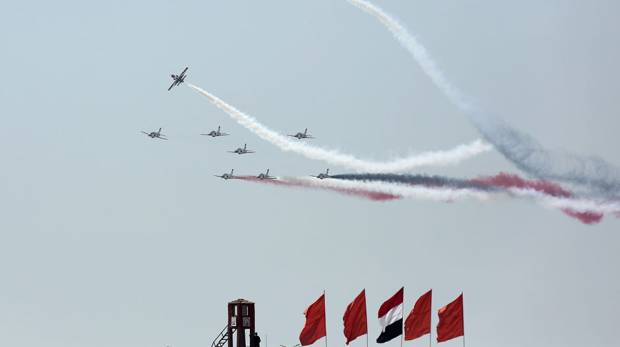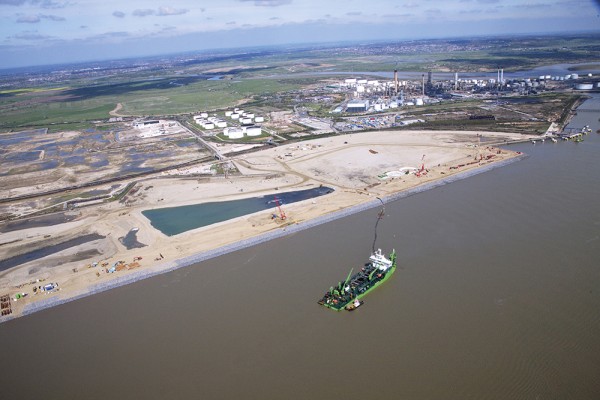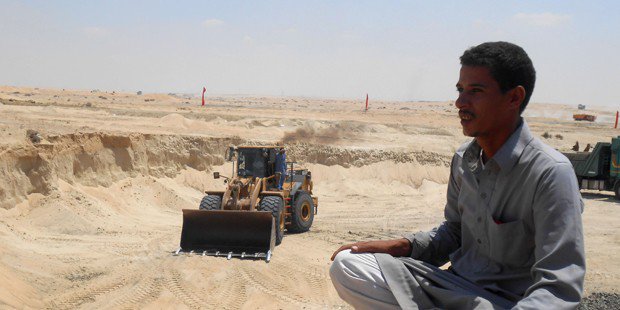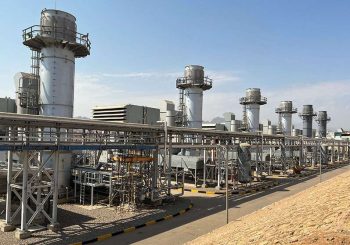Despite Egypt’s round the clock coverage of the New Suez Canal’s lavish opening ceremony, a few key facts regarding the labour conditions of the workers that made it happen were notably missing.
WORKER DEATHS AND INJURIES
According to the Health Ministry – and gaining just a snippet of coverage in state-owned newspaper Al Ahram – a total of 10 workers died and 145 were injured while working on the project.
This was during a year-long period between August 2014 and August 2015, during which the expansion was built.
The mega project –a 72 kilometre expansion of the existing canal – involved around 44,000 workers, military engineers, machinists, technicians and Suez Canal employees.

A spokesperson for the Health Ministry, Hossam Abdel Ghaffar, stated in an interview with Mada Masr that of the 10 workers who died, five were of natural causes, such as pre-existing medical conditions and heart attacks, and the other five were due to industrial accidents.
Equally concerning, 103 workers were reported to have collapsed due to sunstroke, and 41 for venomous scorpion stings. One worker was injured after being bitten by a dog. Workers were exposed to such conditions despite reporting their concerns of being exposed to intense weather and to snakes, scorpions and other insects.
POOR LABOUR CONDITIONS
Labour conditions varied across the thousands of workers, with certain forms of work and rank having access to far higher quality treatment than others. Professionals, and those employed full time by the Suez Canal Authority (SCA) received a healthy salary of thousands of pounds per month and regular bonuses.
The story for part-time, privately contracted and often precarious workers was very different. Seoud Omar, an independent union organiser and SCA employee clarified this in an interview with Mada Masr, stating that for these workers, conditions were “less rewarding, in terms of their hourly pay rates, lengthy work schedules and very exhausting working conditions.”

This was specifically true, according to Omar, for those employed by private contractors, who imposed strenuous working and living conditions on the workers. Egypt signed contracts with six international dredging firms in October 2014: the UAE firm The National Marine Dredging Company; the Dutch based Royal Boskalis Westminster and Van Oord; the Belgian firms Jan de Nul Group and Deme Group as well as US based Great Lakes Dredge and Dock Company.
According to Omar, working hours on the Canal could extend to up to twelve hours per day, despite harsh conditions. Omar also detailed how private contractor employed workers faced even more deplorable conditions, such as restricted access to running water, toilets and often slept without shelter. It is not clear whether such working hours could have been avoided if the canal was built over the projected three years, as opposed to being completed in just one year – a fact that was frequently referenced and celebrated throughout the opening ceremony.






Comments (17)
anyone dying on ANY project is a sad and serious matter and i would always push for more and better safety on any project … but you need to check your facts and read up a bit missy if you want to go publish articles!!! here’s a few facts to put things into perspective: on the New York City water tunnel (not a huge Suez Canal but merely a water tunnel) and with all the quality of life and extra money the USA can afford … yet 24 people died … the panama canal saw 5,609 die and i could go on and quote figures for ALL large and similar projects … with the incredible number of people working on the project, we need to ask how many of them would have died of natural causes or illnesses had they been at home … the rest due to workplace accidents and yes the harsh conditions of the hot egyptian desert … by the way many have interviewed the workers and they DID exert themselves all in long hours but were happily doing so for their country’s welfare! we all risked our lives in one way or another to save Egypt from the terrorist Moslem Brotherhood and the damages they did to our country! we are all still fighting missy! so don’t u sit over there and write such traitorous articles about your own country! read a book or get an education first … or better still visit your country and talk to the people before u publish such biased marie-antoinettian garbage!
This is a new trend in Egypt; bloggers think they’re journalists now. They’re actually convinced that they can turn a blog into a recognized news outlet. It’s quite annoying actually, what’s worse is that people actually share this stuff, and follow it, so there’s actually a backing to all of this, which is much worse.
You’ll find a lot of wanna-be sites like this one, with some pretty half-witted names, like Scoop Empire, yeah you heard right. Or the ‘elite’ one; Cairo Gossip xoxo
You obviously, are a true idiot by definition. The facts are clearly stated and verified. The article speaks to the income inequality and preferential treatment of specific employees. If you lived in Egypt, you know uneducated and unprivileged individuals suffer poor treatment from both public and private sector. So how about you read an actual fact or two of your beloved Egypt and quit reading Sisi propagandist chant about saving it.
i thought the writer might be ikhwan (Moslem Brotherhood) or worse … NOW i’m sure … and i notice the usual thing is that the Moslem brotherhood terrorists use initials only … hundreds of you being paid to post your lies all of the net! even if the people outside Egypt don’t understand the reality happening in Egypt and may believe your propaganda financed by their own USA administration, still we in Egypt DO! traitors and criminals the lot of you, whether the Moslem Brotherhood, ISIL, Daesh, all different names for the same net touting bloodthirsty lying terrorists!
Who wrote this has no clue what the Egyptians life looks like !!
Getting paid nothing and treated like crap. Working under unsafe conditions. There is no such thing as safety in Egypt. This is not surprising at all.
another Moslem brotherhood member with the initials and spreading lies !
No, an expatriate American who has lived in Egypt for 12 years and knows what a f’ed up corrupt mess the country is. No love for the MB here. There is simply no concept of safety in your country. Insha allah. God’s will that I die at the hands of a greedy upper class company owner. People without money are treated like crap in Egypt. What’s the matter Metaphysical, can’t you admit that. You sound like Republican’s in the US insulting people instead of facing the issues. Take care. By the way, the name is Kevin.